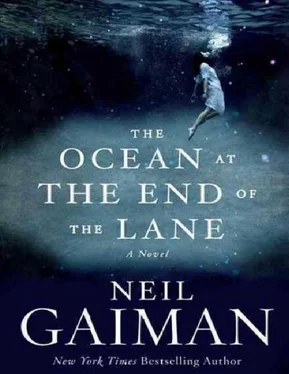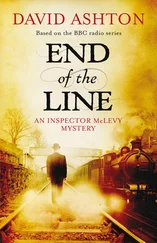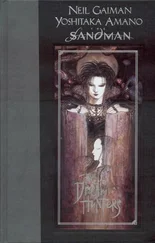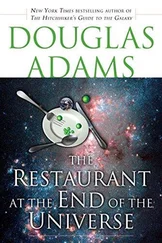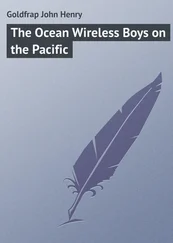I held the worm above the bath’s plug hole, where it wriggled, under the scalding water. Then I let it go, and watched it vanish down the drain. I let the water run for a while, and I washed off the tweezers. Finally I put a small sticking plaster over the hole in the sole of my foot, and put the plug in the bath, to prevent the worm from climbing back up the open plug hole, before I turned off the tap. I did not know if it was dead, but I did not think you came back from the drain.
I put the tweezers back where I had got them from, behind the bathroom mirror, then I closed the
mirror and stared at myself.
I wondered, as I wondered so often when I was that age, who I was, and what exactly was looking at the face in the mirror. If the face I was looking at wasn’t me, and I knew it wasn’t, because I would still be me whatever happened to my face, then what was me? And what was watching?
I went back to the bedroom. It was my night to have the door to the hallway open, and I waited until my sister was asleep, and wouldn’t tell on me, and then, in the dim light from the hall, I read a Secret Seven mystery until I fell asleep.
An admission about myself: as a very small boy, perhaps three or four years old, I could be a monster. “You were a little momzer ,” several aunts told me, on different occasions, once I had safely reached adulthood and my dreadful infant deeds could be recalled with wry amusement. But I do not actually remember being a monster. I just remember wanting my own way.
Small children believe themselves to be gods, or some of them do, and they can only be satisfied when the rest of the world goes along with their way of seeing things.
But I was no longer a small boy. I was seven. I had been fearless, but now I was such a frightened child.
The incident of the worm in my foot did not scare me. I did not talk about it. I wondered, though, the next day, whether people often got foot-worms, or whether it was something that had only ever happened to me, in the orange-sky place on the edge of the Hempstocks’ farm.
I peeled off the plaster on the sole of my foot when I awoke, and was relieved to see that the hole had begun to close up. There was a pink place where it had been, like a blood blister, but nothing more.
I went down to breakfast. My mother looked happy. She said, “Good news, darling. I’ve got a job. They need an optometrist at Dicksons Opticians, and they want me to start this afternoon. I’ll be working four days a week.”
I did not mind. I would be fine on my own.
“And I’ve got more good news. We have someone coming to look after you children while I’m away. Her name is Ursula. She’ll be sleeping in your old bedroom, at the top of the stairs. She’ll be a sort of housekeeper. She’ll make sure you children are fed, and she’ll clean the house—Mrs. Wollery is having trouble with her hip, and she says it will be a few weeks before she can come back. It will be such a load off my mind to have someone here, if Daddy and I are both working.”
“You don’t have the money,” I said. “You said you didn’t have any money.”
“That’s why I’m taking the optometrist job,” she said. “And Ursula’s looking after you for room and board. She needs to live locally for a few months. She phoned this morning. Her references are
excellent.”
I hoped that she would be nice. The previous housekeeper, Gertruda, six months earlier, had not been nice: she had enjoyed playing practical jokes on my sister and me. She would short-sheet the beds, for example, which left us baffled. Eventually we had marched outside the house with placards saying “We hate Gertruda” and “We do not like Gertruda’s cooking,” and put tiny frogs in her bed, and she had gone back to Sweden.
I took a book and went out into the garden.
It was a warm spring day, and sunny, and I climbed up a rope ladder to the lowest branch of the big beech tree, sat on it, and read my book. I was not scared of anything, when I read my book: I was far away, in ancient Egypt, learning about Hathor, and how she had stalked Egypt in the form of a lioness, and she had killed so many people that the sands of Egypt turned red, and how they had only defeated her by mixing beer and honey and sleeping draughts, and dying this concoction red, so she thought it was blood, and she drank it, and fell asleep. Ra, the father of the gods, made her the goddess of love after that, so the wounds she had inflicted on people would now only be wounds of the heart.
I wondered why the gods had done that. Why hadn’t they just killed her, when they had the chance?
I liked myths. They weren’t adult stories and they weren’t children’s stories. They were better than that. They just were.
Adult stories never made sense, and they were so slow to start. They made me feel like there were secrets, Masonic, mythic secrets, to adulthood. Why didn’t adults want to read about Narnia, about secret islands and smugglers and dangerous fairies?
I was getting hungry. I climbed down from my tree, and went to the back of the house, past the laundry room that smelled of laundry soap and mildew, past the little coal-and-wood shed, past the outside toilet where the spiders hung and waited, wooden doors painted garden green. In through the back door, along the hallway and into the kitchen.
My mother was in there with a woman I had never seen before. When I saw her, my heart hurt. I mean that literally, not metaphorically: there was a momentary twinge in my chest—just a flash, and then it was gone.
My sister was sitting at the kitchen table, eating a bowl of cereal.
The woman was very pretty. She had shortish honey-blonde hair, huge gray-blue eyes, and pale lipstick. She seemed tall, even for an adult.
“Darling? This is Ursula Monkton,” said my mother. I said nothing. I just stared at her. My mother nudged me.
“Hello,” I said.
“He’s shy,” said Ursula Monkton. “I am certain that once he warms up to me we shall be great friends.” She reached out a hand and patted my sister’s mousey-brown hair. My sister smiled a gaptoothed smile.
“I like you so much,” my sister said. Then she said, to our mother and me, “When I grow up I warn to be Ursula Monkton.”
My mother and Ursula laughed. “You little dear,” said Ursula Monkton. Then she turned to me. “And what about us, eh? Are we friends as well?”
I just looked at her, all grown-up and blonde, in her gray and pink skirt, and I was scared.
Her dress wasn’t ragged. It was just the fashion ofthe thing, I suppose, the kind of dress that it was. But when I looked at her I imagined her dress flapping, in that windless kitchen, flapping like the mainsail of a ship, on a lonely ocean, under an orange sky.
I don’t know what I said in reply, or if I even said anything. But I went out of that kitchen, although I was hungry, without even an apple.
I took my book into the back garden, beneath the balcony, by the flower bed that grew beneath the television room window, and I read—forgetting my hunger in Egypt with animal-headed gods who cut each other up and then restored one another to life again.
My sister came out into the garden.
“I like her so much,” she told me. “She’s my friend. Do you want to see what she gave me?” She produced a small gray purse, the kind my mother kept in her handbag for her coins, that fastened with a metal butterfly clip. It looked like it was made of leather. I wondered if it was mouse skin. She opened the purse, put her fingers into the opening, came out with a large silver coin: half a crown.
“Look!” she said. “Look what I got!”
Читать дальше
